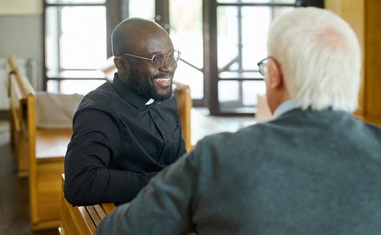The views expressed in our content reflect individual perspectives and do not represent the authoritative views of the Baha'i Faith.
America’s first Race Amity convention – the brainchild of Abdu’l-Baha, based on the Baha’i teachings of the elimination of all racial prejudice – was meant to be the first of many more to come.
RELATED: So That Worldly Prejudices May Not Remain
Abdu’l-Baha crusaded for racial unity all across the North American continent when he traveled across its vast distances in 1912, inspired by the teachings of Baha’u’llah, his father and the prophet and founder of the Baha’i Faith. Baha’u’llah wrote:
My object is none other than the betterment of the world and the tranquillity of its peoples. The well-being of mankind, its peace and security, are unattainable unless and until its unity is firmly established. This unity can never be achieved so long as the counsels which the Pen of the Most High hath revealed are suffered to pass unheeded.
Through the power of the words He hath uttered the whole of the human race can be illumined with the light of unity, and the remembrance of His Name is able to set on fire the hearts of all men, and burn away the veils that intervene between them and His glory.
In previous parts of this series, we recalled and revisited that historic “Convention for Amity Between the Colored and White Races Based on Heavenly Teachings” held at the Congregational Church on 10th and G Street NW in Washington, DC on May 19–21, 1921.
Abdu’l-Baha chose the well-known Washington, D.C. socialite and Baha’i Agnes Parsons to organize this event, and advised her to consult with others in planning it, saying: “I want you to arrange a Convention for unity of the colored and white races. You must have people to help you.”
She did as Abdu’l-Baha instructed. One of those who advised Agnes Parsons was the former U.S. Senator from Minnesota Moses E. Clapp, whose advice became her watchword: “Do not make a protest about anything. Lift the whole matter up into the spiritual realm and work for the creation of sentiment.” As the Convention’s program clearly shows, former Senator Clapp spoke on “The Relation of the Times to World-Wide Peace.”
A little-known fact is that another source of advice was James T. Simpson. The following detailed letter, dated April 10, 1921, from James T. Simpson to Agnes Parsons confirms that fact:
My dear Sister in the Kingdom:-
I have to thank you for your good letter of March 18, 1921, and for the information it contained.
Such a Convention will do a great good if it is conducted Bahai-like, which means advanced and liberal. You said that the proposed Convention was ordered by [Abdu’l-Baha] for the promotion of unity between the white and colored peoples, not particularly for the American Bahais, yet they will be invited; that the purpose is to promote a better understanding of the prejudices [that] may be overcome; appeal being specially made to the conservative element rather than to the radical element; that it will stand for no protests against anything. All of this is very good; but permit me to add to this for your consideration a few suggestions that I consider far-reaching and important.
All of the Baha’is should be prevailed upon to attend this important Convention; and that interested non-Bahais be cordially invited to be present; that it be a truly representative meeting. It affords such a wonderful opportunity for the services the Master [Abdu’l-Baha] demands of us! Who but Bahais could hold such a Convention?
[3] As to the question of an understanding between the whites and the blacks, we have a sufficient understanding to act upon. Every American has an opinion and a plan for the solution of our domestic problems. We need to be converted to a new consciousness that the ruling Dispositions of our lives be changed to “follow Justice” and to “love Mercy” that the “Golden Rule” may be applied. In other words, to become real Bahai! That is our aim; that is the desire of [Abdu’l-Baha]!
We have a Southern Sociological Congress, a Race Congress, a National Association for the Advancement of Colored Peoples, and many other lesser agencies which claim to be aiming at the same thing we desire. [4] Some are doing good while the success of the others seems to be negligible. We Bahais must at least profit by their patent errors in policy and action. I am sure that we will. Are the terms “radical and conservative elements” good Bahai designations? To me, they do not sound well on account of their vagueness. The Abolitionists (blessings on their memory) were the radicals and the slave owners, the conservatives during their day. Mrs. Stowe’s little book [Uncle Tom’s Cabin] was placed upon the Index for its ultra-radicalism, Garrison was mobbed and Lovejoy, murdered for their radicalism. They essayed to oppose human slavery — property in Man! I could multiply illustrations. Need I mention the Cause of the Hope of our Souls, His Holiness Bahaullah and the Blessed Center of the Covenant, — how they were treated? Yea, no. We all know and understand! Presently, our antebellum thinking whites are called “radical crackers”, e.g. Vandeman and the late Tillman, by certain of the blacks; and Du Bois is called “radical” by most persons of southern sentiment on our so-called race problem. So “radical” is an epithet for the social reformers we do not agree with; and “conservative”, for those with whom we agree.
Then let everybody be invited who has something to enlighten us upon, and have it understood that threats, protests and arguments will not be allowed,— no “answering” by speakers, but positive statements must be adhered to. We should devote several sittings to these speakers. Let them be required to go before a competent Bahai Committee and state the gists of their brief addresses. Let them speak alternatingly — one white, and one colored. After these talks, let certain persons of note, who hold the public’s confidence for liberality and advanced views, like Mr. Julius Rosenwald and Miss Jane Addams of Chicago, Mr. Seligman of New York, enlighten us. Then, some competent Bahais state the Bahai Remedy for the world’s ills. Let reverence reign, the love of our Lord be dominant, mutual love for each other manifest, and that the Holy Spirit will gain Victory! The advancement of the Cause of God is the desire of our souls!
Our Lord [Abdu’l-Baha] in a recent Tablet to me stated that He cherished the hope that the “discord between the colored and the white will gradually disappear[,] that the Oneness of the World of Humanity will shine”. So, I know His Mind and Interest in this matter. Let us Bahais accelerate harmony, love, justice and mutual consideration in this beautiful land of ours!
I hope you will take these suggestions as coming from a humble servant in the Kingdom who has no desire but the Glory of God. I am sure your views as to the conduct and operation of that momentous Convention coincide with my own. This is a great opportunity! May Bahaullah el Abha be upon you all! Let me hear from you soon.
Yours in His Service,
James T. Simpson
RELATED: Why a Harlem Baptist Preacher Became a Baha’i
This advice and input offered to Agnes Parsons, who was organizing and planning the “Convention for Amity Between the Colored and White Races Based on Heavenly Teachings,” is significant – especially considering the fact that the only other African American Baha’i who gave Parsons advice on how this convention should be conducted was Louis Gregory. How much of Simpson’s advice Agnes Parsons actually took to heart and incorporated into the planning for this event is not known.
In the next article, we’ll introduce Rev. Simpson’s Baha’i wife, Caroline Simpson. Caroline was his second wife – James Simpson was a widower with four children. Caroline’s contributions to Baha’i community building deserve recognition in their own light.


















Comments
Sign in or create an account
Continue with Facebookor